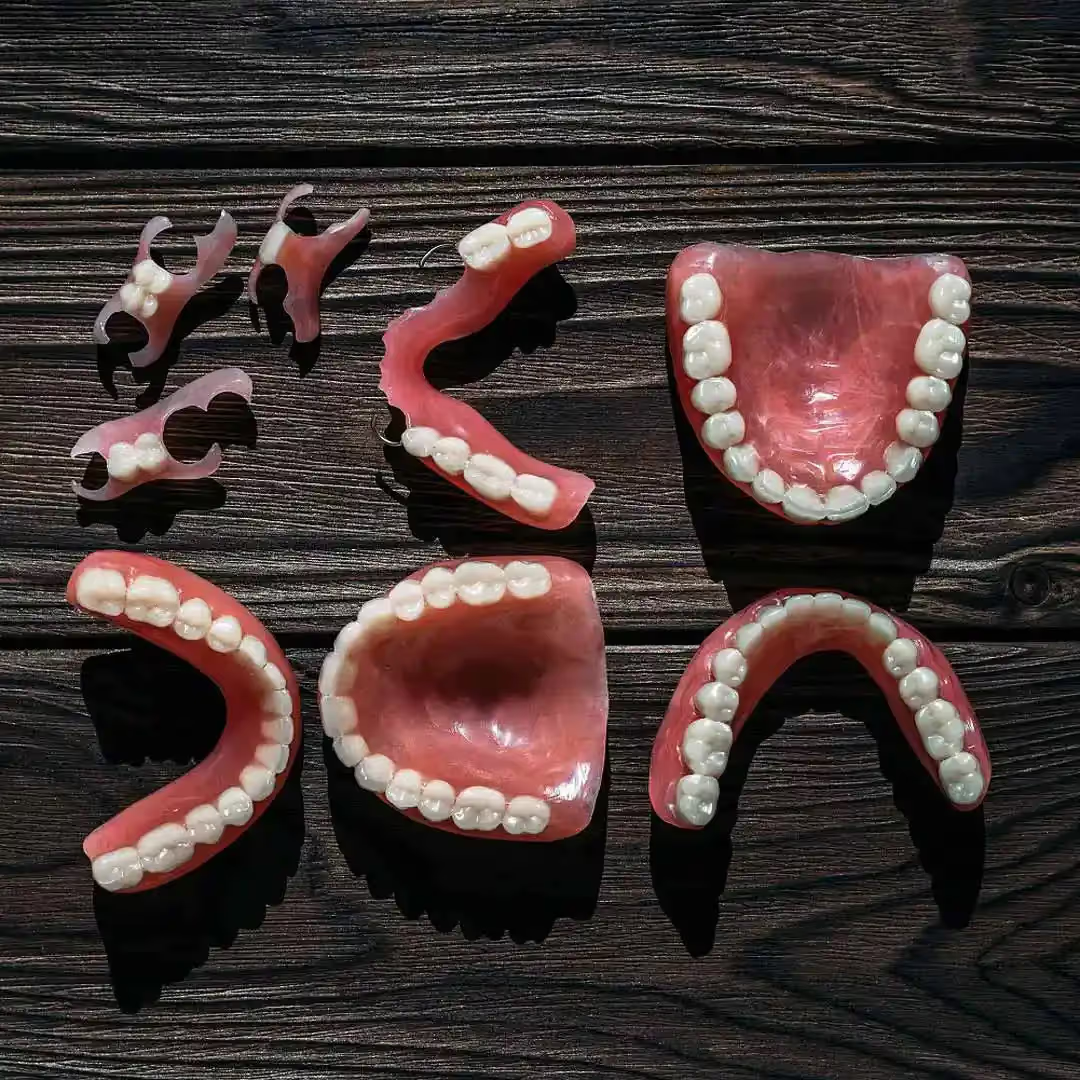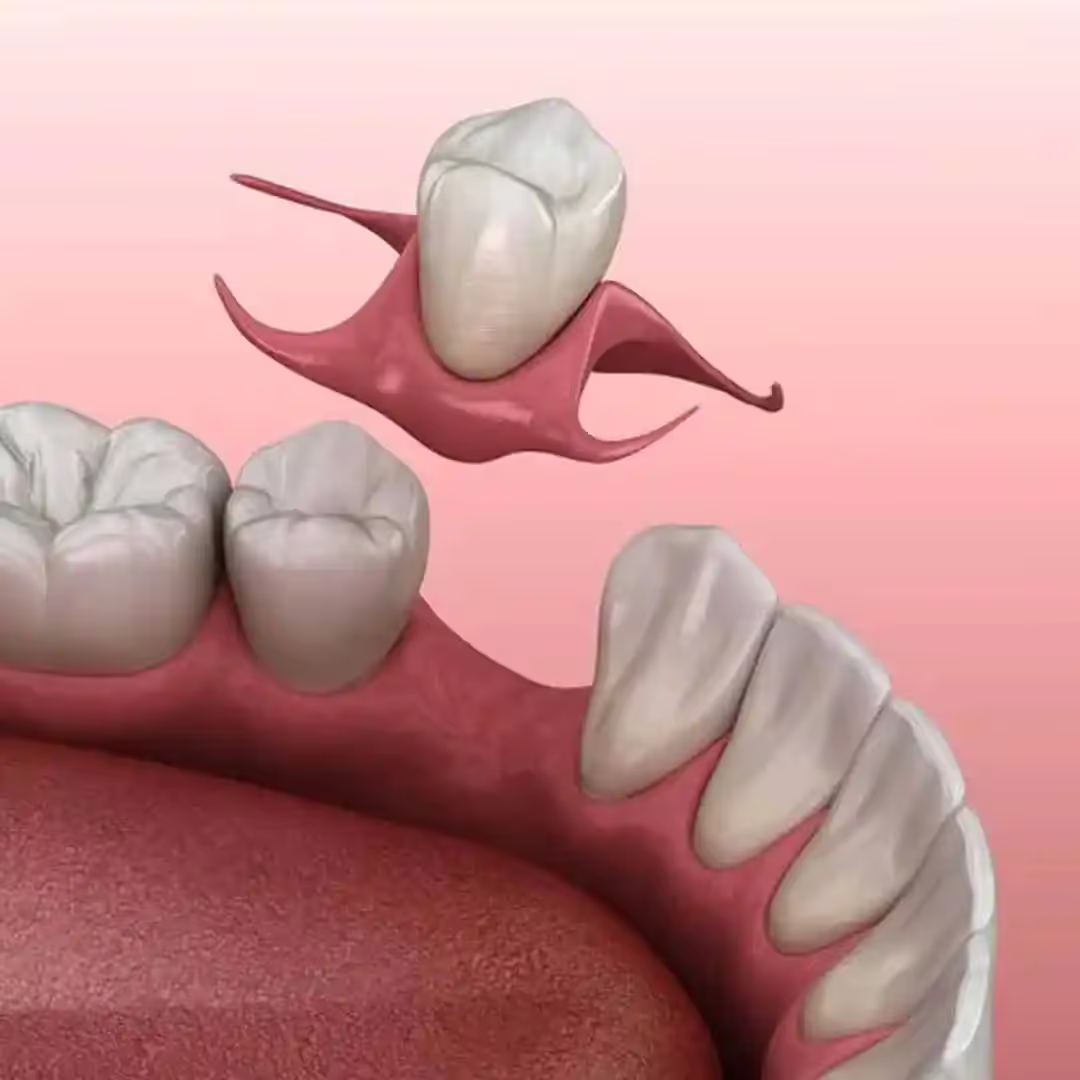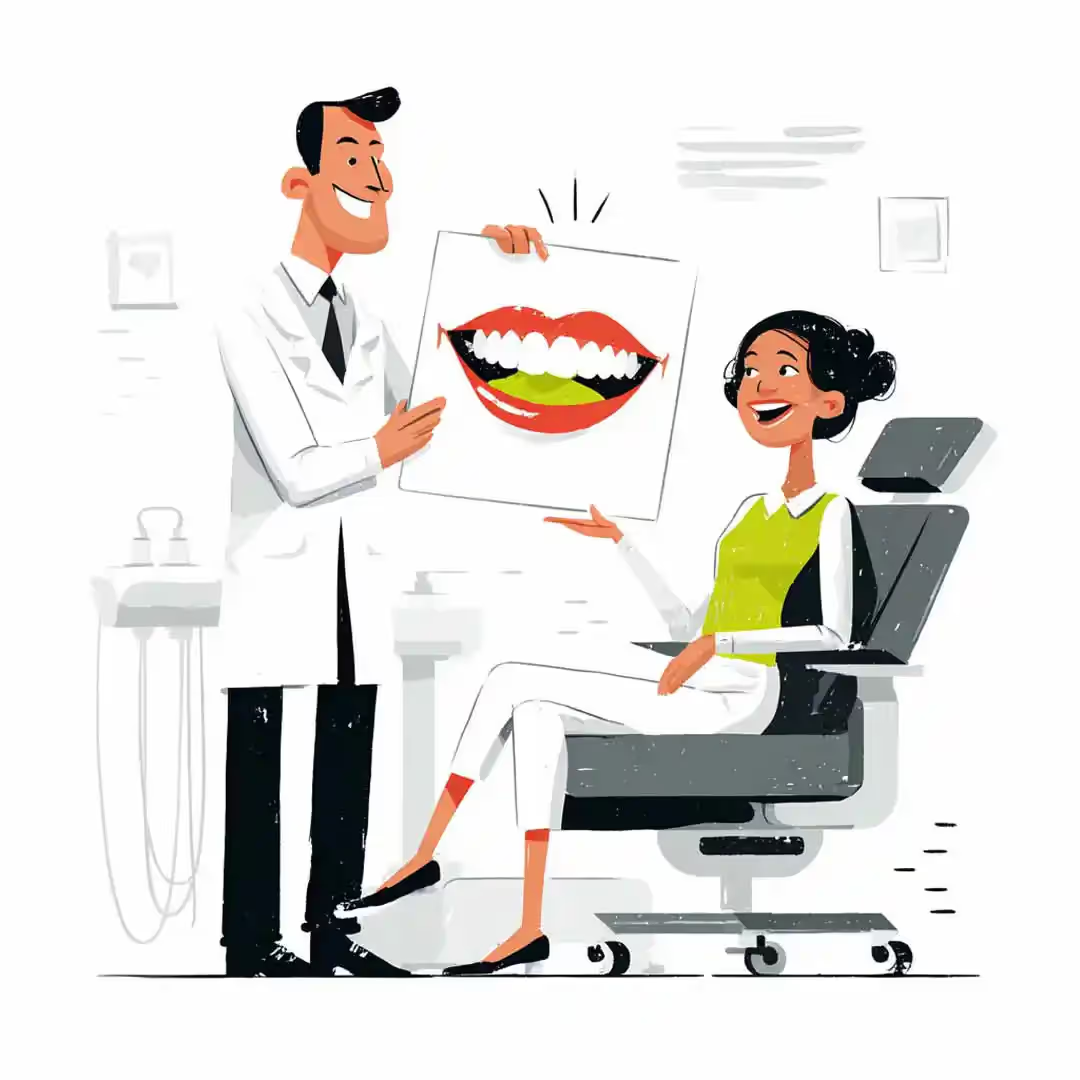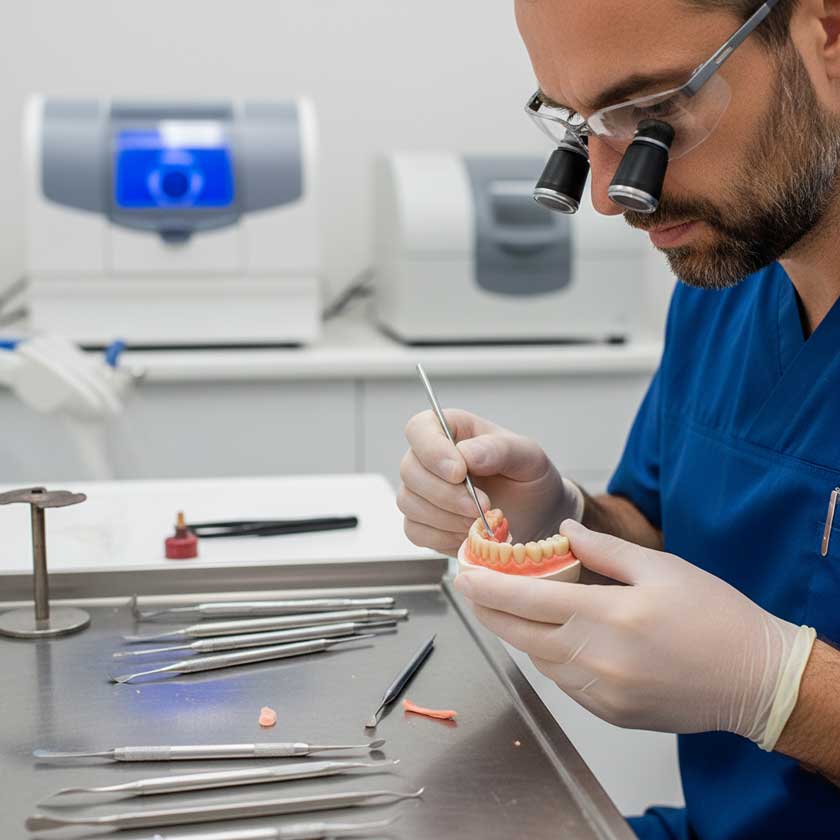When facing tooth extraction and dentures, one of the biggest decisions you'll make is choosing between immediate and conventional dentures. After helping thousands of patients through this decision at New Smile Dentures over the past 60+ years, I've seen firsthand how the right choice can make all the difference in your comfort, confidence, and wallet.
Let me break down everything you need to know to make the best decision for your situation.
Key Takeaways:
- Immediate dentures are placed the same day as tooth extraction, providing a temporary solution so you never go without teeth
- Conventional dentures require 8-12 weeks of healing before placement but offer a more accurate and precise fit
- Immediate dentures typically cost more due to multiple adjustments and potential remakes
- Your lifestyle, dental health, and budget should guide your decision
- Professional consultation helps determine if you're a good candidate for either option

What are immediate dentures?
Immediate dentures are exactly what they sound like – dentures you receive immediately after tooth extraction. We take impressions of your mouth before your teeth are extracted, which allows us to create dentures that match the exact shape of your mouth for a more precise fit. The immediate denture is placed during the same visit as your tooth extractions, offering a comfortable fit and helping to control bleeding.
While immediate dentures are made in advance and may not offer as precise a fit as conventional dentures, they are designed to be as comfortable as possible during the healing period. You literally walk out with teeth the same day.
What are conventional dentures?
Conventional dentures take a different approach. After tooth extraction, there is a waiting period of several weeks to allow the mouth to heal before conventional dentures are made. This waiting period ensures the gums and jaw have fully healed, allowing for a more accurate fit.
Once healing is complete, impressions are taken to create custom fitted, permanent dentures—also known as complete dentures or full dentures—that replace missing teeth. Conventional dentures are designed to fit the mouth after it heals, providing a long-term solution for those who have had all their teeth extracted. This means going without teeth during the healing period.
The real cost breakdown
Let's talk numbers – because I know that's what you're really wondering about.
The cost of immediate dentures is often higher compared to conventional dentures due to the advanced planning, materials, and quicker placement required. Costs can vary depending on whether you need upper and lower dentures, and lower dentures may have different cost considerations than upper ones. For many patients, the total cost for upper and lower dentures together is an important factor to consider.
Premium dentures, which may include features like mesh liners or metal or mesh liners, can significantly increase the price—especially for a full set of upper and lower dentures. These high-end options are custom-made and designed for durability, with costs that may range from $2,000 to $4,000 per plate.
Immediate dentures:
- Initial cost: $1,500 - $3,500 per arch
- Required relines: $300 - $500 (multiple needed)
- Potential remake: $1,500 - $3,500
- Total first-year cost: $3,300 - $7,500 per arch
Immediate dentures often require more frequent adjustments and more adjustments overall as your mouth heals and changes shape after extractions. Some patients may also wear immediate dentures for an extended period before transitioning to permanent dentures.
Conventional dentures:
- Cost: $1,500 - $3,500 per arch
- Relines: $300 - $500 (typically one)
- Total first-year cost: $1,800 - $4,000 per arch
Conventional dentures are made after your gums and jaw have fully healed, which allows for a more accurate fit and precise fit. This ensures greater comfort, improved function, and better long-term results.
Here's what most denture clinics won't tell you: immediate dentures almost always need to be remade within the first year. Your gums and bone change dramatically during healing, and those immediate dentures that fit on day one won't fit well after six months. At New Smile Dentures, we're upfront about this reality during your free consultation.
The benefits comparison
Immediate dentures advantages:
- Never go without teeth – This is the big one. Immediate dentures provide a temporary solution for tooth replacement, acting as false teeth so you maintain your appearance and can continue work and social activities. They help in maintaining aesthetics and provide a natural appearance immediately after extractions.
- Easier adjustment – You learn to eat and speak with dentures while your mouth is still numb
- Gum protection and bleeding control – Dentures act like a bandage over extraction sites to protect gum tissue and help control bleeding during the healing process
- Maintain facial structure – Prevents immediate muscle collapse
- Psychological comfort – No "toothless" period
- Good candidate and quality of life – Many patients are good candidates for immediate dentures, and this option can significantly improve quality of life during the transition period by restoring confidence, oral function, and overall well-being while the healing process takes place
Conventional dentures advantages:
- Custom fitted permanent dentures – Conventional dentures are custom fitted as permanent dentures or complete dentures after your mouth has fully healed, ensuring a more accurate fit and precise fit for maximum comfort and function
- Full dentures replace missing teeth long-term – Full dentures are designed to replace missing teeth, providing a stable, comfortable, and long-term solution after healing
- Better initial fit – Created after healing means more accurate impressions
- Lower overall cost – No remake needed
- Fewer adjustments – More stable from day one
- Predictable results – We know exactly what we're working with
- One-and-done – Get it right the first time

Who should choose immediate dentures?
After decades of fitting dentures, I recommend immediate dentures if you:
- Are a good candidate based on your dental health and overall oral condition
- Cannot take extended time off work
- Have important social events coming up
- Feel anxious about being without teeth
- Have good bone density and healthy gums
- Understand and accept the additional costs
- Have realistic expectations about multiple adjustments
- Have discussed with your dentist which type of denture—immediate or traditional—best matches your needs, lifestyle, and dental health
Who should choose conventional dentures?
Conventional dentures are often chosen by those seeking complete dentures or full dentures as a permanent denture solution, especially if their dental health allows for a longer healing period. Conventional dentures make more sense if you:
- Want the most cost-effective option
- Can manage the healing period without teeth
- Have severe gum disease or bone loss
- Want the best possible fit from the start
- Prefer fewer dental visits
- Are on a fixed budget
The healing timeline reality
Immediate dentures timeline:
- Day 1: Extractions and denture placement
- Week 1: First adjustment appointment
- Weeks 2-4: Multiple adjustments as swelling reduces
- Months 2-3: Temporary soft reline
- Months 4-6: Another soft reline
- Month 6-12: Hard reline or remake
Note: The healing process after extractions means immediate dentures often require more adjustments over an extended period as the mouth heals and changes shape.
Conventional dentures timeline:
- Day 1: Extractions
- Weeks 8-12: Healing complete (it takes several weeks for the mouth to heal before impressions are taken)
- Week 12: Impressions taken
- Week 14: Try-in appointment
- Week 15: Final delivery
- Month 6: Minor adjustment if needed
What about eating?
This is where expectations meet reality. Eating with lower dentures or a full set of upper and lower dentures can be challenging at first, especially as the lower jaw adapts to the new fit. With immediate dentures, you'll start with liquids and very soft foods, gradually working up to regular foods over several months. The jaw's shape and healing can affect how quickly you adapt to eating with your new dentures, and the constant adjustments mean your chewing efficiency changes frequently.
Conventional denture wearers often adapt faster once they receive their dentures because their gums and jaw are fully healed and stable. Within a few weeks, most are eating normally.
The hidden costs nobody mentions
Beyond the price tags, consider these factors:
Immediate dentures:
- Time off work for multiple adjustments
- Soft food diet costs more than regular food
- Potential embarrassment from loose dentures
- Adhesive costs (more needed during healing)
- Emotional stress from constant changes
- Choosing premium dentures with advanced features such as mesh liners or metal or mesh liners can result in a higher cost, often ranging from $2,000 to $4,000 per plate
Conventional dentures:
- Possible temporary employment impacts
- Social isolation during healing
- Nutritional challenges during healing
- Potential depression from appearance changes
Caring for your dentures
Caring for your immediate dentures or permanent dentures is essential for keeping your smile healthy, comfortable, and looking its best. Whether you're wearing temporary dentures right after tooth extraction or have settled into your final set, a good care routine helps maintain a proper fit, reduces the need for frequent adjustments, and supports your overall oral health.
Here are some simple but important tips to keep your dentures in top shape:
- Clean your dentures daily: Just like natural teeth, dentures need to be cleaned every day to remove food particles, plaque, and bacteria. Use a soft-bristled brush and a non-abrasive denture cleanser—never regular toothpaste, which can scratch the surface.
- Handle with care: Dentures can break if dropped. Always clean them over a folded towel or a sink filled with water to cushion any falls.
- Soak overnight: Most dentures need to stay moist to keep their shape. Place them in a denture-soaking solution or plain water overnight, unless your dental professional advises otherwise.
- Rinse after eating: Remove and rinse your dentures after meals to wash away food debris and help prevent gum irritation.
- Maintain your oral health: Even without natural teeth, it's important to brush your gums, tongue, and any remaining teeth with a soft brush to stimulate gum tissue and reduce the risk of infection.
- Schedule regular dental visits: Your dentist will check the fit of your dentures, make any necessary adjustments, and monitor your gum tissues for signs of irritation or other issues.
By following these steps, you'll help your immediate dentures or permanent dentures last longer, fit better, and keep your mouth healthy. Good care means fewer trips for adjustments and a more confident, comfortable smile every day.

Making your decision: My professional recommendation
After fitting thousands of dentures, here's my honest advice: if you can manage the healing period without teeth, conventional dentures offer better long-term value and satisfaction. However, if going without teeth would significantly impact your mental health or livelihood, immediate dentures are worth the extra investment.
It is essential to consult with experienced dentists or denturists to determine the best type of denture for your individual needs. They can help you understand the differences between immediate and traditional dentures, and how each option can affect your quality of life, including restoring your confidence, oral functionality, and overall well-being.
The key is working with experienced denturists who will be honest about what to expect. Too many clinics push immediate dentures without explaining the full journey ahead.
Why experience matters
At New Smile Dentures, we've refined our process over 60+ years. Our experienced dentists and denturists play a crucial role in ensuring optimal dental health and successful denture outcomes. We know exactly how gums heal, how bone remodels, and what adjustments you'll need. This experience means:
- More accurate cost estimates upfront
- Fewer surprise appointments
- Better fitting dentures, faster
- Realistic expectations from day one
Special considerations for your situation
If you're young (under 50): Immediate dentures might be worth it to maintain your professional image. Many patients in this age group are good candidates for this type of denture, especially if their dental health supports a quick transition.
If you're retired: Conventional dentures, a common type of denture, often make more sense financially and practically. Many patients find this option better suited to their dental health needs and lifestyle.
If you have medical conditions affecting healing: Discuss both types of dentures thoroughly with your denturist to determine which type is best for your dental health. Not everyone is a good candidate for immediate dentures, so your overall health and oral condition should be considered.
If cost is your primary concern: Conventional dentures are almost always more economical, and for many patients, this type of denture provides a balance between affordability and maintaining dental health.
The bottom line
Both immediate and conventional dentures can give you a beautiful, functional smile. The difference is in the journey to get there. When considering dentures vs other tooth replacement options, it's important to understand that immediate and traditional dentures each serve as a type of denture designed to meet different needs after tooth extraction.
Immediate dentures offer convenience but require patience and additional investment, serving as an effective tooth replacement while your mouth heals. Conventional dentures require initial sacrifice but often provide better long-term satisfaction. Choosing the right type of denture can significantly impact your quality of life by restoring aesthetics, confidence, and oral function.
Ready to make your decision?
The best choice depends on your unique situation, lifestyle, and priorities. That's why we offer free consultations at New Smile Dentures. Our experienced dentists will examine your mouth, assess your dental health, and determine if you are a good candidate for a particular type of denture—such as immediate or traditional dentures—based on your individual needs. We'll discuss your lifestyle and help you make an informed decision without pressure.
During your consultation, we'll:
- Assess your current oral health and overall dental health
- Discuss realistic timelines for both options
- Provide detailed cost breakdowns
- Show you actual before/after cases
- Answer all your questions honestly
Don't make this decision based on internet research alone. Every mouth is different, and what worked for your neighbor might not work for you.
Schedule your free consultation today and let's create a plan that fits your life, budget, and smile goals. With locations throughout the region and flexible scheduling, we make it easy to get the honest, experienced advice you deserve.
Remember, at New Smile Dentures, we've been creating smiles for over 60 years. We've seen it all, done it all, and we're here to guide you through every step of your denture journey.
Call us today or book online for your free, no-obligation consultation. Because everyone deserves to smile with confidence.
Contact New Smile Dentures:
- Caldwell: (208) 454-0311
- Boise: (208) 323-7990
- Schedule online
Related articles
Learn more about your denture journey:
- Understanding denture discomfort
- The importance of addressing denture pain
- Relief from gum irritation with dentures
FAQ - Immediate vs. conventional dentures
What's the main difference between immediate and conventional dentures? Immediate dentures are placed the same day as tooth extraction, while conventional dentures require 8-12 weeks of healing before placement. This affects cost, fit, and the number of adjustments needed.
Are immediate dentures worth the extra cost? It depends on your situation. If you cannot afford to be without teeth due to work or social obligations, immediate dentures are worth the investment. However, if you can manage the healing period, conventional dentures offer better value.
How many adjustments will immediate dentures need? Most patients need 3-4 soft relines in the first year, plus potentially a complete remake. The healing process causes significant changes in your mouth shape, requiring frequent adjustments.
Can I eat normally with immediate dentures? You'll start with liquids and soft foods, gradually progressing to regular foods over 3-4 months. Conventional denture wearers typically adapt faster since their mouths are fully healed.
Will insurance cover immediate dentures? Most insurance plans cover dentures similarly, whether immediate or conventional. However, they may not cover all the additional adjustments immediate dentures require. We'll check your coverage during your free consultation.







